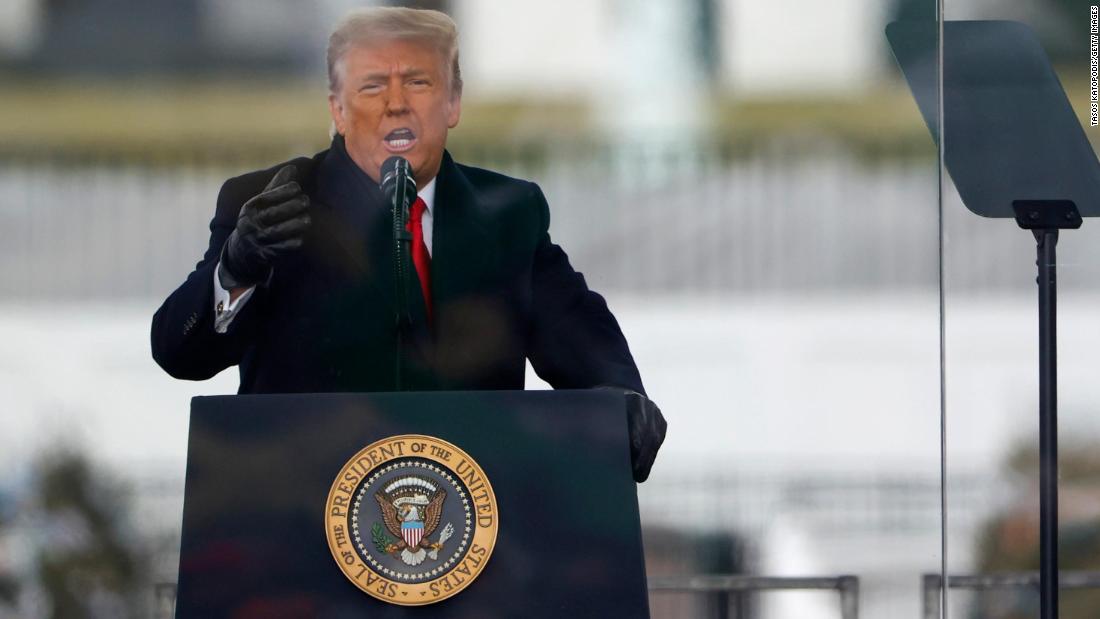
The article of impeachment passed by the House in January reads, in part: "Donald John Trump engaged in high Crimes and Misdemeanors by inciting violence against the Government of the United States." Read the whole thing here.
House impeachment managers have devoted most of their presentation this week to the results, airing graphic video footage and audio from the attack on the Capitol -- which put members of the Senate, who will vote on the charges, personally at risk. Their argument is that Trump was responsible for what happened, even though he did not join the mob that marched from his January 6 rally near the White House to the US Capitol, where electoral votes were being tallied to seal Joe Biden's victory.
Here's what they said:
- "He had incited the attack. The insurgents were following his commands," said Texas Democratic Rep. Julian Castro.
- "He directed all of the rage that he had incited to January 6. That was his last chance to stop the peaceful transition of power," said Rep. Eric Swalwell of California. He later added, "This was not just any old protest. President Trump was inciting something historic."
- "This was deliberate," said Virgin Islands Del. Stephanie Plaskett. "And because the President of the United States incited this, because he was orchestrating this, because he was inviting them, the insurgents were not shy about their planning."
Trump's defenders, namely Sen. Ted Cruz of Texas, have argued that Trump can't be held accountable because the people who made up the mob are "entitled to be idiots" and Trump was just whipping up the crowd, which is what politicians do.
"The President's language at times is a little overheated," Cruz told Sean Hannity on Fox News. "But if you look at the language he used, saying things like 'fight,' saying things like 'go retake our country', if that is now incitement then we better prepare a long line to indict every candidate for office, anyone who's ever run."
We should note here that Cruz, in the days before the January 6 riot, was himself egging on election-skeptics to fight against the counting of electoral votes and promising them "we will win." He also lodged the first of two Republican objections to the counting of the votes, challenging Arizona's results -- at around the same time the first wave of rioters reached the Capitol grounds. So Cruz has a personal interest in Trump's words not being incitement.
Cruz also pointed out Trump told the festering mob to be peaceful, which he did, once -- as opposed to the 20 times he told the crowd to "fight," according to the impeachment managers. You can read Trump's whole January 6 speech here.
But what is incitement, exactly?
The dictionary definition of "incite," according to Merriam-Webster, is simple: "to move to action : stir up : spur on : urge on." Trump clearly did that, when he directed his supporters to march toward Capitol Hill from a rally held under the "Stop the Steal" banner.
But there's a much more detailed definition in US law, which is:
"...the term 'to incite a riot', or 'to organize, promote, encourage, participate in, or carry on a riot", includes, but is not limited to, urging or instigating other persons to riot, but shall not be deemed to mean the mere oral or written (1) advocacy of ideas or (2) expression of belief, not involving advocacy of any act or acts of violence or assertion of the rightness of, or the right to commit, any such act or acts."
Federal courts said Trump did not incite a mob back in 2016 when he told supporters to turn on protesters, who later sued the President.
The New York Times has a thorough examination of how courts have looked upon "incitement." Read that here.
The history of 'incitement'
Oliver Wendell Holmes, the First Amendment-protecting Supreme Court justice who pushed the idea that a person can't shout fire in a crowded theater, built the "clear and present danger" test for speech. He argued Congress could only regulate speech when it represented a "present danger of immediate evil or an intent to bring it about."
Those words were written in the World War I era, when Congress and President Woodrow Wilson actively limited what Americans could say against the government and war effort.
More recently, the Supreme Court has protected all sorts of speech, like flag burning, crude political hyperbole and, importantly in this instance is Brandenburg v. Ohio, which allows advocating crime as long as it doesn't incite imminent lawlessness. Read more on that from CNN's Eliot McLaughlin.
Trump's legal team repeatedly cited that case in a legal brief laying out their free speech-focused defense.
This is a political case
But impeachment is not a criminal or a civil case, it's a political one, and the impeachment managers are arguing "high Crimes and Misdemeanors," which is different than a regular court case.
Did Trump encourage people who turned into a mob to march on the Capitol? Indisputably. Did he tell them to "fight?" Yes. Is that inciting a mob against democracy? We shall see, when it comes time for the Senate to vote.
Clearly, the idea of incitement brushes up against the First Amendment protection of free speech, and Trump's defense has already focused on this constitutional protection.
That he's seeking the protection of the Constitution after arguably inciting a mob to stop the counting of electoral votes -- which would have short-circuited the Constitution -- is not something they've addressed.
"What" - Google News
February 12, 2021 at 12:05AM
https://ift.tt/3d1Qw4z
What is 'incitement' -- and what does it mean for Trump's impeachment defense? - CNN
"What" - Google News
https://ift.tt/3aVokM1
https://ift.tt/2Wij67R
Bagikan Berita Ini














0 Response to "What is 'incitement' -- and what does it mean for Trump's impeachment defense? - CNN"
Post a Comment